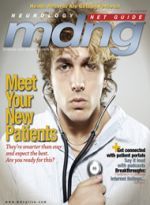4 Questions with... James Valeriano, MD, Speaker for the "Speaking Out for Epilepsy" Podcast
4 Questions with... James Valeriano, MD, Speaker for the "Speaking Out for Epilepsy" Podcast
1 What are the key messages of the “Speaking Out for Epilepsy” podcast?
We are trying to tell people with epilepsy that they shouldn’t keep it a secret—it’s not a burden they have to keep to themselves—and that they can live normal lives, have any kind of job, and achieve whatever they want in life. Also, we wanted to take some of the mystery away from epilepsy and get it out in the open. We’re telling patients, “You can tell your co-workers that you have epilepsy; it’s nothing to be ashamed of. It’s not an aspersion on you or your character. Just go about life like you normally would.” It’s something that is certainly challenging to those who have epilepsy, but it doesn’t have to defi ne you and change your whole life.
2 Why did you get involved?
I specialize in epilepsy, so the vast majority of my patients are people with epilepsy. What I see is not just the affect of the condition on people—the medical aspects of it—but I see how it impacts their quality of life. I also see parents who shelter children too much, or a spouse who will shelter their spouse too much. In other words, it has an effect socially on what people do, what they do academically, and what they do in their profession. They’re felt to be limited in what they can do. After having seen this for all these years, I thought “It’s time that people get past that and take a more modern and intricate approach to the problem.”
3 What are the benefits of using a podcast to deliver the “Speaking Out for Epilepsy” message?
It attracts more young people; podcasts are more their medium. Certainly, we want to speak to everybody, but the earlier you can reach someone with a message, the better chance you have to affect them. If a patient can come to terms with the condition early in life and move past it, that’s what we’re hoping for. Print journalism certainly has its place. We’ve given messages on radio, and we’ve even had TV spots, but a different group of people may use the podcast, and it broadens the audience we get.
4 Aside from this podcast, what online resources do you recommend to patients with epilepsy?
The two biggest are:
- The American Epilepsy Society website, which provides more medical and scientific information, as well as information about current research and cuttingedge technology. Although it’s more directed toward doctors, there certainly are things of interest to patients at the site.
- The Epilepsy Foundation of Americawebsite, which is a bit more directed toward the patient. It certainly providesinformation on different medicines, various treatments and surgical procedures, and vagal nerve stimulation, but it also provides information about resources in the community, job placement, legal aspects, and driving laws.
